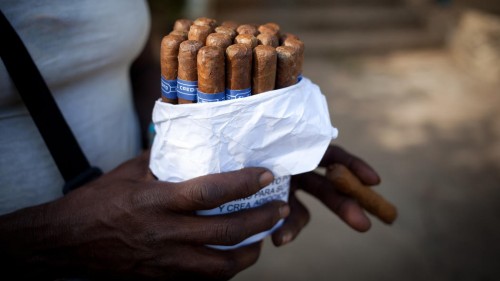
The Obama administration began to chip away at the U.S. embargo against Cuba, announcing new changes taking effect Friday that will allow more trade and travel between the two countries.
The changes were announced despite concerns from members of Congress that the landmark shift in U.S.-Cuba relations is a “one-sided deal” that will benefit the Castro regime.
They come three days after U.S. officials confirmed the release of 53 political prisoners Cuba had promised to free. But some of those prisoners reportedly are still facing restrictions and being monitored.
Announced Thursday, the new Treasury and Commerce Department regulations are the next step in President Obama’s goal of re-establishing diplomatic relations with the government of Cuban President Raul Castro, Fidel’s younger brother.
Only Congress can end the five-decade embargo. But the measures make a number of changes weakening it.
Among them, they would allow U.S. citizens to start bringing home small amounts of Cuban cigars after more than a half-century ban.
They would give permission for Americans to use credit cards in Cuba and U.S. companies to export telephone, computer and Internet technologies. Investments in some small business are permitted. General tourist travel is still prohibited, but Americans authorized to visit Cuba need no longer apply for special licenses.
Obama vowed to soften the embargo last month and begin restoring diplomatic ties with Havana, saying “these 50 years have shown that isolation has not worked.” The deal was the product of 18 months of secret talks that culminated in the exchange of imprisoned spies and release of Alan Gross, a U.S. government contractor who had been imprisoned in Cuba for five years.
The sudden rapprochement between Cold War foes has divided U.S. lawmakers across party lines and interests.
Among Republicans and Democrats in Congress, Cuban-Americans such as Sens. Marco Rubio of Florida and Bob Menendez of New Jersey have been particularly vocal in opposition.
Rubio on Thursday questioned whether the changes were even legal.
“This is a windfall for the Castro regime that will be used to fund its repression against Cubans, as well as its activities against U.S. national interests in Latin America and beyond,” he said in a statement. “Given existing U.S. laws about our Cuba policy, this slew of regulations leave at least one major question President Obama and his administration have failed to answer so far: what legal authority does he have to enrich the Castro regime in these ways?”
He said the “one-sided deal is enriching a tyrant and his regime at the expense of U.S. national interests and the Cuban people.”
But White House Press Secretary Josh Earnest said the changes would help “empower the Cuban population to become less dependent upon the state-driven economy, and help facilitate our growing relationship with the Cuban people.”
“We firmly believe that allowing increased travel, commerce, and the flow of information to and from Cuba will allow the United States to better advance our interests and improve the lives of ordinary Cubans,” he said in a statement.
Some pro-business types have welcomed the opportunity to open up a new export market in a country so close to American shores. The head of the U.S. Chamber of Commerce, for example, said Wednesday it was better for the U.S. to sell computers, smartphones and cars to Cuba than to cede such business to countries like Russia and China. Still, the embargo as a whole appears unlikely to fall anytime soon.
Starting Friday, U.S. companies will be able to export mobile phones, televisions, memory devices, recording devices, computers and software to a country with notoriously poor Internet and telecommunications infrastructure.
Americans permitted to travel to Cuba for family visits, official U.S. government business, journalism, research, education, religious activity and other reasons fall under a U.S. general license and don’t need to apply for a separate license. A limit on remittance payments to family members in Cuba will be raised to $8,000 per year, from $2,000 per year. Americans visiting Cuba will be allowed to bring home $100 in alcohol and tobacco products, and $400 in total goods.
Other changes include:
–Travel agents and airlines can fly to Cuba without a special license.
–Insurance companies can provide coverage for health, life and travel insurance policies for individuals residing in or visiting Cuba.
–Financial institutions may open accounts at Cuban banks to facilitate authorized transactions.
–Investments can be made in some small businesses and agricultural operations.
U.S. and Cuba are scheduled to hold migration talks in Havana next week, the next step in their normalization process. Leading the American delegation is Roberta Jacobson, the top U.S. diplomat for Latin America. Her visit marks the highest-level trip to Cuba by a U.S. official since 1980.
Further down the road, Washington envisions reopening the U.S. Embassy in Havana.
Fox News

Leave a Reply
You must be logged in to post a comment.